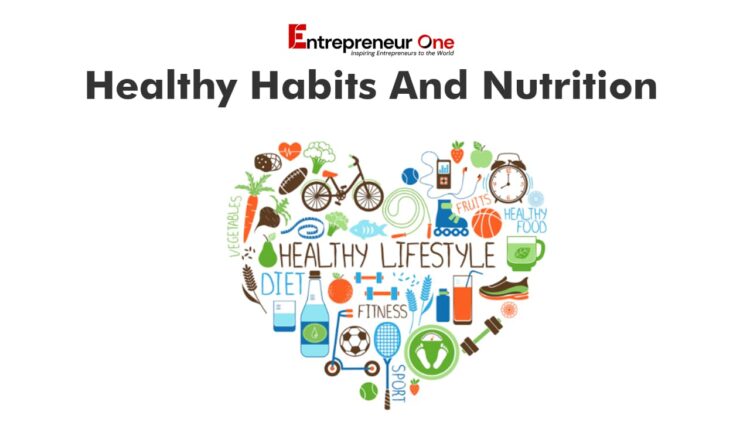Maintaining a healthy lifestyle is crucial for overall well-being. Healthy habits and nutrition play a vital role in preventing chronic diseases, improving mental health, and increasing energy levels. In this overview, we’ll explore the importance of healthy habits and nutrition and provide practical tips for incorporating them into your daily life. Healthy habits are directly proportional to our emotions and our mental state. This may help us to be healthy human beings.
IMPORTANCE OF HEALTHY HABITS
- Prevents Chronic Diseases: Healthy habits, such as regular exercise and a balanced diet, can help prevent chronic diseases like heart disease, diabetes, and certain types of cancer. We should always be aware of the news going on around us.
- Improves Mental Health: Healthy habits, such as meditation and yoga, can help reduce stress and anxiety and improve overall mental well-being. We should always maintain a healthy routine to improve our mental health.
- Increases Energy Levels: Healthy habits, such as getting enough sleep and exercising regularly, can help increase energy levels and reduce fatigue. The more we are healthy the more we become energetic.
- Supports Healthy Weight: Healthy habits, such as eating a balanced diet and exercising regularly, can help support a healthy weight and reduce the risk of obesity-related diseases.
IMPORTANCE OF NUTRITION
- Provides Essential Nutrients: A balanced diet provides essential nutrients, such as vitamins, minerals, and macronutrients, that are necessary for maintaining optimal health. Our body needs several nutrients, and in order to maintain a healthy body and mind, healthy food is important.
- Supports a Healthy Weight: A balanced diet can help support a healthy weight and reduce the risk of obesity-related diseases.
- Reduces Chronic Disease Risk: A balanced diet can help reduce the risk of chronic diseases, such as heart disease, diabetes, and certain types of cancer. We can live a healthy and great life with a balanced diet.
- Supports Healthy Gut Bacteria: A balanced diet that includes fermented foods and fiber can help support healthy gut bacteria, which is essential for maintaining a strong immune system.
HEALTHY HABITS TO INCORPORATE INTO YOUR DAILY LIFE
- Regular Exercise: Aim for at least 150 minutes of moderate-intensity exercise or 75 minutes of vigorous-intensity exercise per week. Exercising may reduce health-related problems, and you may lead a healthy life.
- Balanced Diet: Focus on eating a variety of whole, unprocessed foods, including fruits, vegetables, whole grains, lean proteins, and healthy fats. We shouldn’t eat an excess of any food. Instead we should have a balanced diet to cover up our needs easily.
- Adequate Sleep: Aim for 7-9 hours of sleep per night to help your body and mind recharge. Sleeping plays a vital role in a healthy body and mind. It is proven that a person who sleeps well is more effective and productive than a person who sleeps less.
- Stress Management: Engage in stress-reducing activities, such as meditation, yoga, or deep breathing exercises, to help manage stress and anxiety. Do what you love to do; it will help you manage your stress.
- Social Connection: Make time for social connections, such as spending time with friends and family, to help support mental health and well-being. Being with people heals us and lets us see life from a different perspective
HEALTHY NUTRITION TIPS
- Eat a Variety of Whole Foods: Focus on eating a variety of whole, unprocessed foods, including fruits, vegetables, whole grains, lean proteins, and healthy fats. Eating a balanced diet may help.
- Limit Processed and Sugary Foods: Limit your intake of processed and sugary foods, such as packaged snacks, sugary drinks, and refined grains. Eat more natural food than processed food for your body and mind to process properly.
- Stay Hydrated: Drink plenty of water throughout the day to help stay hydrated and support overall health. Drinking water helps in the proper functioning of the body.
- Watch Portion Sizes: Pay attention to portion sizes and aim to eat until you’re satisfied rather than stuffed. Do not do stress eating.
- Cook at Home: Cooking at home allows you to control the ingredients and portion sizes of your meals, making it easier to make healthy choices. Eating street food may have a bad impact on your body.
BENEFITS OF A BALANCED DIET
- Supports a Healthy Weight: A balanced diet can help support a healthy weight and reduce the risk of obesity-related diseases.
- Reduces Chronic Disease Risk: A balanced diet can help reduce the risk of chronic diseases, such as heart disease, diabetes, and certain types of cancer.
- Supports Healthy Gut Bacteria: A balanced diet that includes fermented foods and fiber can help support healthy gut bacteria, which is essential for maintaining a strong immune system.
- Improves Mental Health: A balanced diet that includes foods rich in omega-3 fatty acids, vitamin D, and other essential nutrients can help improve mental health and reduce the risk of depression and anxiety.
- Increases Energy Levels: A balanced diet that includes foods rich in iron, B vitamins, and other essential nutrients can help increase energy levels and reduce fatigue.
COMMON NUTRITION MISTAKES
- Not Eating Enough Fruits and Vegetables: Fruits and vegetables provide essential vitamins, minerals, and antioxidants that are necessary for maintaining optimal health. It may lead to a lack of nutrition in your body, and your body may catch the disease.
- Consuming Too Much Sugar: Consuming too much sugar can lead to a range of health problems, including obesity, type 2 diabetes, and heart disease. Consuming too much sugar may affect your health badly.
- Not Drinking Enough Water: Not drinking enough water can lead to dehydration, fatigue, and a range of other health problems. Water may help in the proper functioning of the body.
- Eating Too Much Processed Food: Processed foods are often high in unhealthy ingredients, such as added sugars, salt, and unhealthy fats.
- Not Getting Enough Omega-3 Fatty Acids: Omega-3 fatty acids are essential for heart health, brain function, and other bodily processes.














